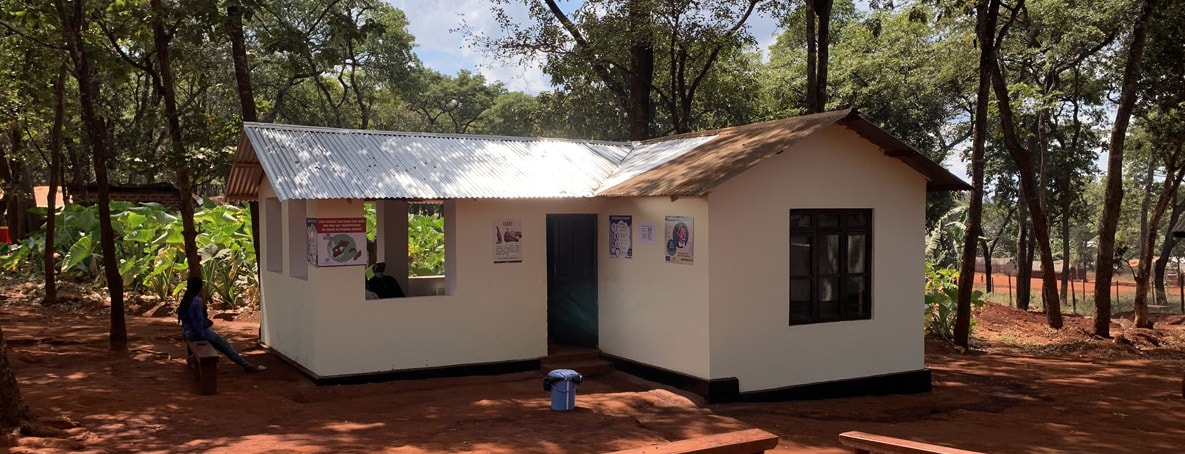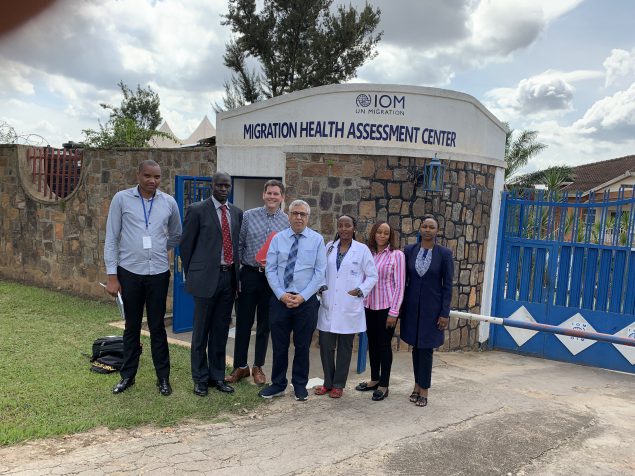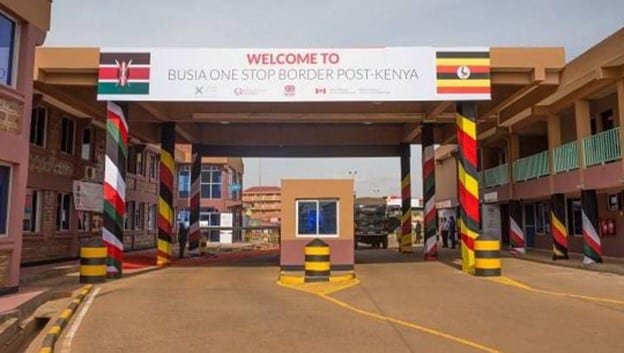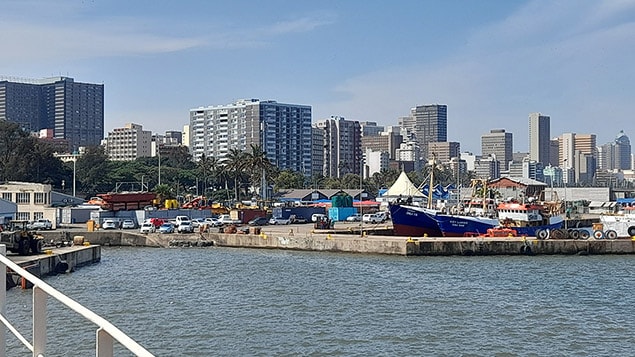DGMH’s Work in Africa

CDC’s Africa Field Program in the Division of Global Migration Health (DGMH-Africa) is based at the CDC-Kenya office in Nairobi. DGMH-Africa works throughout the region to help prevent, detect, and respond to public health threats in mobile populations. Additionally, the team oversees the required medical examination of refugee and immigrant visa applicants before they relocate to the U.S. The team also supports governments across the region by strengthening public health at points of entry and monitoring and responding to communicable diseases of public health concern among travelers. DGMH-Africa brings together expertise in epidemiology, medicine, statistics, and logistics. Data collection and analysis are core to every aspect of the work as it provides evidence to inform public health action.
DGMH’s Impact in Africa

Thousands of refugees and immigrants are admitted annually into the United States from Africa. DGMH-Africa works closely with many partners to ensure the health and well-being of refugees coming to the U.S. and to improve the health of African refugee and migrant communities by:
- Partnering with the International Organization for Migration (IOM), Ministries of Health, United Nations Refugee Agency (UNHCR), and camp implementing partners to conduct research and implement projects that provide evidence for public health interventions
- Partnering with UNHCR, ministries of health, and other partners to respond to outbreaks in refugee settings
- Establishing surveillance in refugee camps to monitor disease trends over time
- Improving diagnostic capacity in refugee settings to strengthen early detection of epidemic-prone diseases
- Working with partners to strengthen systems that improve data management, continuity of care, and public health programs
- Conducting site visits and training for panel physicians performing resettlement medical exams of refugees and immigrants—detecting and treating deadly diseases like tuberculosis
United States Refugee Admissions Program (USRAP)
The United States Refugee Admissions Program (USRAP) resettles many refugees from Africa. DGMH-Africa works with the IOM. Bureau of Population, Refugees and Migration (PRM), Resettlement Support Center (RSC), and others to ensure the health and well-being of refugees coming to the U.S.
The team tracks and monitors disease outbreaks that may impact resettlement activities, and designs necessary interventions. These efforts are jointly coordinated with IOM, UNHCR, and other partners to ensure timely information sharing and necessary actions.
- United Republic of Tanzania
- Rwanda
- Uganda
- Kenya
- Burundi
Source: Electronic Data Notification System (EDN)
Refugee Health
DGMH-Africa takes every opportunity to support public health programs that benefit camp-wide refugee populations. Activities have included:
- Since 2007, DGMH-Africa supported UNHCR and International Rescue Committee (IRC) in building laboratory capacity to culture and identify bacteria in both Dadaab and Kakuma IRC hospitals.
- In collaboration with UNHCR, Association of Public Health Laboratories (APHL), Kenya Medical Laboratory Technologists and Technicians Board (KMLTTB), and IOM, DGMH-Africa advocated for the establishment of COVID-19 testing in Kenyan refugee camps Dadaab and Kakuma. The camps began using the GeneXpert platform in May 2021.
Disease Surveillance and Outbreak Response
DGMH-Africa works with health implementing partners, including the UNHCR and IRC in refugee camps to support the implementation of respiratory disease surveillance in Dadaab and Kakuma refugee camps in Kenya. These systems have been instrumental in supporting and guiding UNHCR and implementing partners in monitoring disease trends.
In addition, the team offered support in analyzing data from the COVID-19 outbreak in refugee camps in Kenya. This analysis helped the team understand the evolution and impact of the COVID-19 pandemic in these settings.
Strengthening Vaccine Delivery Systems
As a result of the COVID-19 pandemic in 2022, DGMH-Africa has been supporting COVID-19 vaccination efforts in refugee camps in Tanzania, Kenya, and Ethiopia to improve COVID-19 vaccine uptake and the overall vaccine delivery systems in these areas.
![]()
![]()
Issued recommendations to reduce the risk of malaria among refugees, including voluntary malaria chemoprophylaxis for refugees and enhanced febrile illness surveillance.
Issued recommendations to reduce the risk of malaria among refugees, including voluntary malaria chemoprophylaxis for refugees and enhanced febrile illness surveillance.
![]()
![]()
Established agreements with private panel physicians to provide medical exams for refugees in locations where IOM lacks COVID-19 testing for refugees departing from countries in west, central and southern Africa.
Established agreements with private panel physicians to provide medical exams for refugees in locations where IOM lacks COVID-19 testing for refugees departing from countries in west, central and southern Africa.
![]()
![]()
Hosted a webinar with IOM for non-IOM panel physicians explaining supplemental guidance for refugee processing.
Hosted a webinar with IOM for non-IOM panel physicians explaining supplemental guidance for refugee processing.
![]()
![]()
Worked with partners to implement an overseas presumptive treatment program for intestinal parasites and a cost-effective vaccination program targeting 13 vaccine-preventable diseases in US-bound refugees in 20 countries, including 9 in Africa. Since 2013, more than 177,000 refugees have been vaccinated overseas.
Worked with partners to implement an overseas presumptive treatment program for intestinal parasites and a cost-effective vaccination program targeting 13 vaccine-preventable diseases in US-bound refugees in 20 countries, including 9 in Africa. Since 2013, more than 177,000 refugees have been vaccinated overseas.
Border Health

Border health is the area of public health that focuses on mobile populations and the communities they visit or stay in before, during, and after travel. Border health supports these populations while they are in their country and after they have relocated to the U.S.
Points of Entry
Prevention of importation and exportation of infectious diseases across borders requires strong preparedness and response capacity at points of entry (POE) into a country.
Across the region, DGMH-Africa provided technical assistance in developing POE Public Health Emergency Response Plans (PHERPs) and Standard Operating Procedures (SOPs). These SOPs and other border health activities help to strengthen cross-border collaboration, characterize cross-border population movement, improve community-based surveillance among border populations, and strengthen public health systems to prevent, detect and respond to communicable diseases among border populations.
In addition, DGMH-Africa partnered with the East African Community and Kenya Ministry of Health’s (MOH) Port Health Services to create a 5-year Kenya Port Health Strategic Plan 2022-2026.
Travelers’ Health
Traveling can increase the likelihood of a person getting sick. DGMH-Africa works to prevent illness during and after travel by providing timely and relevant information to travelers, healthcare providers, and public health authorities.
DGMH-Africa supported Kenya’s Ministry of Health in drafting Kenya-specific travel-related frequently asked questions (FAQs) [PDF – 8 pages]. These FAQs focused mostly on COVID-19 vaccination and testing and requirements for entering the country.
The team also supported the digitization of the Travelers’ Health Surveillance Form, giving international air travelers the ability to notify public health officials of COVID-19-like symptoms before and after arrival in Kenya.
Lastly, DGMH-Africa supported the development of a mobile phone- and web-based application, Jitenge, for transnational truckers. It allowed transnational truck drivers and crews to notify public health officials electronically about COVID-19-like symptoms before and after arrival in Kenya. The success of this project resulted in the development of the Regional Electronic Cargo and Driver Tracking System for use by transnational truck drivers and crew in Kenya, Uganda, Rwanda, and Burundi.
From August 1, 2020, to January 15, 2021, 339,969 travelers were processed using the Jitenge application.
- Democratic Republic of Congo
- Sudan
- Somalia
- Eritrea
- Ethiopia
Source: Refugee Processing Center (RPC)
- Immigrant and Refugee Health
- Technical Instructions for Civil Surgeons
- Technical Instructions for Panel Physicians
- Refugee Health Profiles
- Overseas Refugee Health Guidance
- CDC in Kenya
- UNHCR Kenya Infographics and camp population statistics
- Integrated Refugee Health Information System
- Uganda Refugee Influx Dashboard
